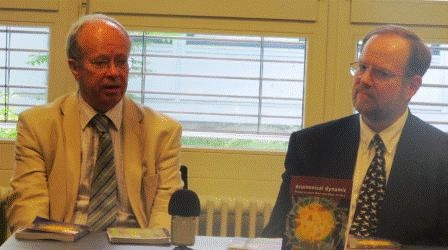- Français
- |
- Booklist
- |
- Week of Prayer
- |
- Links
- Areopagus - a forum for dialogue
- Academic journals
- Acronyms
- Bible tools
- Bibliographies
- Booksellers and publishers
- Churches
- Canadian church headquarters
- Directory of Saskatchewan churches
- Retreat centres
- Saskatchewan church and non-profit agencies
- Ecumenism.net Denominational links
- Anabaptist & Mennonite
- Anglican
- Baptist
- Evangelical
- Independent episcopal
- Lutheran
- Methodist, Wesleyan, and Holiness
- Miscellaneous
- Mormon
- Orthodox (Eastern & Oriental)
- Para-church ministries
- Pentecostal / charismatic
- Presbyterian & Reformed
- Quaker (Society of Friends)
- Roman & Eastern Catholic
- United and uniting
- Documents of Ecumenical Interest
- Ecumenical agencies
- Ecumenical Booklist
- Ecumenical Dialogues
- Glossary
- Human rights
- Inter-religious links
- Justice & peace
- Lectionaries
- Religious news services
- Resource pages
- Search Ecumenism.Net
- |
- Documents
- Ancient & Medieval texts
- Ecumenical Dialogues
- Interreligious
- Anabaptist & Mennonite
- Anglican
- Evangelical
- Lutheran
- Orthodox
- Reformed & Presbyterian
- Roman & Eastern Catholic
- United & Uniting
- Miscellaneous churches
- Canadian Council of Churches (CCC)
- Conference of European Churches (CEC)
- Interchurch Families International Network (IFIN)
- National Council of Churches in Australia (NCCA)
- Lausanne Committee for World Evangelism (LCWE)
- World Council of Churches (WCC)
- Other ecumenical documents
Church traditions
Documents from ecumenical agencies
- |
- Dialogues
- Adventist-Reformed
- African Instituted Churches-Reformed
- Anglican-Lutheran
- Anglican-Orthodox
- Anglican-Reformed
- Anglican-Roman Catholic
- Anglican-United/Uniting
- Baptist-Reformed
- Disciples of Christ-Reformed
- Disciples of Christ-Roman Catholic
- Evangelical-Roman Catholic
- Lutheran-Mennonite
- Lutheran-Mennonite-Roman Catholic
- Lutheran-Reformed
- Lutheran-Roman Catholic
- Mennonite-Reformed
- Mennonite-Roman Catholic
- Methodist-Reformed
- Methodist-Roman Catholic
- Oriental Orthodox-Reformed
- Orthodox-Reformed
- Orthodox-Roman Catholic
- Pentecostal-Reformed
- Prague Consultations
- REC-WARC Consultations
- Roman Catholic-Lutheran-Reformed
- Roman Catholic-Reformed
- Roman Catholic-United Church of Canada
- |
- Quick links
- Canadian Centre for Ecumenism
- Canadian Council of Churches
- Ecumenical Shared Ministries
- Ecumenism in Canada
- Interchurch Families International Network
- International Anglican-Roman Catholic Commission for Unity and Mission
- Kairos: Canadian Ecumenical Justice Initiatives
- North American Academy of Ecumenists
- Prairie Centre for Ecumenism
- Réseau œcuménique justice et paix
- Week of Prayer for Christian Unity
- Women's Interchurch Council of Canada
- World Council of Churches
- |
- Archives
- |
- About us
Ecumenical Dynamic: Living in More than One Place at Once
— May 29, 201329 mai 2013Theologian sees ecumenism as the dynamism of a renewed Christianity
Asserting that “We are in danger of losing what the ecumenical spirit is all about,” historical theologian and longtime ecumenical activist Keith Clements argued on 28 May at a presentation in the Ecumenical Centre in Geneva that people and churches need to rediscover the essential “ecumenical dynamic” at the heart of the movement.
“There is a need… to restore the word ecumenical to proper and positive use… The story, past and to the present, needs to be told,” he has written.
At once critical and encouraging, Clements complained that often “an obsession with identity today,” evident in resurgent confessionalism, ethnocentrism and nationalism, leaves people less willing “to step outside their home, their tradition and inhabit another’s tradition,” meet each other’s needs and serve the larger good.
A former general secretary of the Conference of European Churches, Clements is a historical theologian and Bonhoeffer scholar.
At the session, led by WCC senior editor Theodore A. Gill, Jr., Clements discussed his new book, Ecumenical Dynamic: Living in More than One Place at Once, published by World Council of Churches Publications.
Clements argued that one’s Christian identity is not a fixed thing, encapsulated by one’s tradition. “Instead, identity is a quest,” he said, and “you discover your identity as you relate to others.”
Fundamental to the ecumenical movement, he said, has been the human impulse, central also to biblical spirituality, to cross boundaries and understand each other through “an exchange of life and experience” that leads to mutuality and common witness and service.
Clements’s book illustrates its central thesis by rereading ecumenical history in that light, including events leading to Edinburgh 1910, the Life and Work movement, the Barmen Declaration and European churches at the end of the Soviet era.
Discussion of Clements’s presentation and the book raised questions about the relation of peace and justice to unity, whether the ecumenical movement is simply “a Eurocentric venture” and unable to reshape its agenda for a new religious landscape, the relative demands of interchurch and interfaith encounter, and the role of ecumenism in unmasking unauthentic religious elements in contemporary culture.
In the end, he asserted, ecumenism attempts to help us identify “with the worldwide church, a sign and embodiment of the body of Christ” in today’s world.
Listen to Keith Clements on the “ecumenical dynamic”
Cover image, endorsements and ordering information for Ecumenical Dynamic
High resolution photos can be requested via photos.oikoumene.org

 Permanent link: ecumenism.net/?p=4621
Permanent link: ecumenism.net/?p=4621
Categories: WCC News • In this article: books, Christian unity, ecumenism

 Lien permanente : ecumenism.net/?p=4621
Lien permanente : ecumenism.net/?p=4621
Catégorie : WCC News • Dans cet article : books, Christian unity, ecumenism

